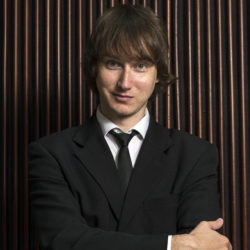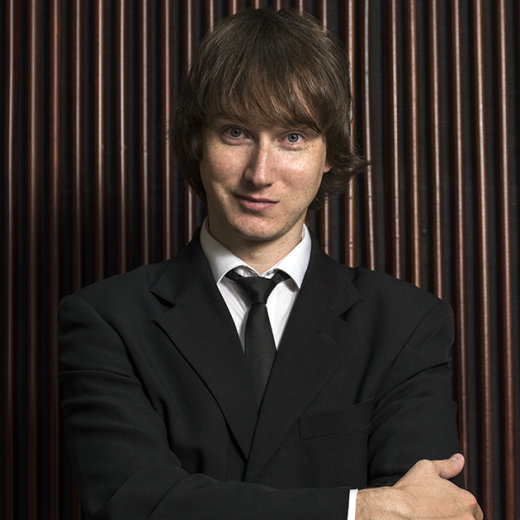 United Kingdom Beethoven: Scottish Chamber Orchestra / Maxim Emelyanychev (conductor). City Halls, Glasgow, 6.3.2020. (GT)
United Kingdom Beethoven: Scottish Chamber Orchestra / Maxim Emelyanychev (conductor). City Halls, Glasgow, 6.3.2020. (GT)

Beethoven – Symphony No.6 in F major, Op.68 ‘Pastoral’, Symphony No.7 in A major, Op.92
This concert was the penultimate part of the SCO’s contribution to the Beethoven year, and followed upon the RSNO’s ‘Beethoven Revolution’ opening two weeks ago. The BBC Scottish Symphony Orchestra will play all the symphonies over four days in May as their ‘Beethoven Roots Festival’. Just one Beethoven symphony will be performed by the SCO according to the newly published programme for the 2020-21 season.
Maxim Emelyanychev has already recorded the ‘Eroica’ Symphony with the Nizhny-Novgorod Youth Orchestra, and this was the first occasion for Scottish audiences to hear the young Russian conducting a Beethoven symphony. The orchestral seating plan was different from previously adopted set-ups; the double basses were on the left behind the first violins, and the cellos were next to the second violins on the right. I understand that at the Usher Hall, on the previous evening, the double basses were behind the woodwind.
The opening bars of the Sixth Symphony’s Allegro ma non troppo were elegant and in beautiful harmony on the strings, with Emelyanychev adopting the composer’s written tempo – something not always implemented by conductors. Rather than an amble through the countryside, this was more like a brisk walk, with a fresh breeze behind you. Throughout this opening movement, Emelyanychev was like a living metronome, almost dancing, and constantly gesturing – without a baton – to his players, his fingers moving as if he was at the harpsichord. This achieved remarkable results with magnificent playing notably from the clarinet of Maximiliano Martin, and the oboe of Robin Williams. The music was radiant and cheerful, as if we were sharing Beethoven’s happiness far from the hustle and bustle of Vienna. In the Andante, again there was supreme articulation from the woodwind group – one could sense a pleasant stroll through a summer meadow by a gurgling stream. The woodwind playing – in the evocation of the quail, nightingale, and the cuckoo – was out of this world. The Allegro was a marvellously dramatic evocation of village festivities as if we were all taking part in the merry dances: it was so wondrously led by the conductor. Nikita Naumov on the bass, and Philip Higham on the cello initiated the Allegro’s thunderstorm, and this brief, yet thrilling passage witnessed some exciting playing, especially from the trumpets, and Louise Goodwin on the timpani. In the finale (Allegretto), the advent of a glowing radiance on the strings brought a sense of renewal and wellbeing and the symphony closed on a marvellously beautiful passage on the violins. This interpretation of the Pastoral is probably the finest performed in this hall for many years, and certainly the best that I have heard for a long time.
It is only a couple of weeks ago that Elim Chan directed a marvellous performance of Beethoven’s Seventh symphony with the RSNO (review click here). That was quite sensational, however, the standards of performance by this orchestra and the conducting of Emelyanychev promised something even more special.
Emelyanychev adopted the precise tempo for the opening movement – Poco sostenuto-Vivace – and one was struck by the loudness of the orchestra’s playing – especially the woodwind. It is clear that with the slightest movement, or gesture, the conductor can get a quite different modulation or nuance from his players. There was some fantastic playing with an energetic pulse racing through the orchestra, most of all in the transition to Vivace, and there were brilliant dance-like rhythms. In the Allegretto, the tone was not so tragic, with the quite remarkable uplifting melody on the second violins and cellos, switching back to the first violins, though more lyrical in the emotional scale, and graceful in dignity, with extraordinary clarinet articulation by Martin. In the Presto, the super-fast tempo was amazing – I have never seen these musicians play so fast – this was like the type of electricity Toscanini generated many years ago. The Trio was beautifully performed in recalling the ancient Austrian pilgrims’ hymn. In the finale (Allegro con brio) the pace was startingly brisk and immensely exciting – with the main idea from an Irish folk song ‘Save me from the grave and wise’ heard. Donald Tovey wrote here of ‘Bacchic-like fury’, and indeed there was a swift transition towards a whirling energetic dance, and the exhilarating climax. This was a perfect performance of a perfect symphony. What a good idea it would be if a recording of Beethoven was to emerge from this group of players and their brilliant young conductor!
Gregor Tassie
